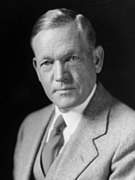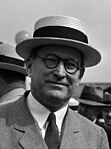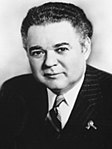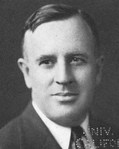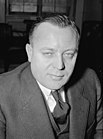1942 United States Senate elections
| ||||||||||||||||||||||||||||||||||||||||||||||||||||||||||||||||||||||||||
34 of the 96 seats in the United States Senate 49 seats needed for a majority | ||||||||||||||||||||||||||||||||||||||||||||||||||||||||||||||||||||||||||
|---|---|---|---|---|---|---|---|---|---|---|---|---|---|---|---|---|---|---|---|---|---|---|---|---|---|---|---|---|---|---|---|---|---|---|---|---|---|---|---|---|---|---|---|---|---|---|---|---|---|---|---|---|---|---|---|---|---|---|---|---|---|---|---|---|---|---|---|---|---|---|---|---|---|---|
| ||||||||||||||||||||||||||||||||||||||||||||||||||||||||||||||||||||||||||
 Results of the elections: Democratic hold Republican gain Republican hold No election Rectangular inset (Colorado): both seats up for election | ||||||||||||||||||||||||||||||||||||||||||||||||||||||||||||||||||||||||||
| ||||||||||||||||||||||||||||||||||||||||||||||||||||||||||||||||||||||||||
The 1942 United States Senate elections were held November 3, 1942, midway through Franklin D. Roosevelt's third term as president. The 32 seats of Class 2 were contested in regular elections, and two special elections were held to fill vacancies.
Although this election took place during World War II, the opposition Republican party made major gains, taking eight seats from the Democrats and one from an independent. The Democrats nonetheless retained a significant majority, though the smallest since Roosevelt was first elected in 1932. However, for the first time since 1932, Democrats did not have a supermajority.
The New York Times ascribed the results to "voters' dissatisfaction with the conduct of the war, both at home and abroad" but not evidence of a lack of enthusiasm for the war effort. It found that a candidate's stance as isolationist or interventionist before Pearl Harbor had little impact on his success at the polls.[3] The paper's editorial board welcomed a return to normal political alignments after the unbalanced majorities of the previous decade.[4] The election not only changed the numbers of Democrats and Republicans in the Senate, but also accomplished an ideological shift, as several longtime enthusiastic supporters of the New Deal were replaced by Republicans of the most conservative sort.[5]
The Republicans gained enough seats to end the Democrats' supermajority control.[6] Democrats later gained a seat in New Jersey through an appointment, bringing their seat total up to 58.
Results summary
[edit]| 57 | 1 | 38 |
| Democratic | P | Republican |
Colored shading indicates party with largest share of that row.
| Parties | Total | ||||||||||||||||||||||||||||||||||||||||||||||||||||||||||||||||||||||||||||||||||||||||||||||||||
|---|---|---|---|---|---|---|---|---|---|---|---|---|---|---|---|---|---|---|---|---|---|---|---|---|---|---|---|---|---|---|---|---|---|---|---|---|---|---|---|---|---|---|---|---|---|---|---|---|---|---|---|---|---|---|---|---|---|---|---|---|---|---|---|---|---|---|---|---|---|---|---|---|---|---|---|---|---|---|---|---|---|---|---|---|---|---|---|---|---|---|---|---|---|---|---|---|---|---|---|
| Democratic | Republican | Progressive | Other | ||||||||||||||||||||||||||||||||||||||||||||||||||||||||||||||||||||||||||||||||||||||||||||||||
| Last elections (1940) | 66 | 28 | 1 | 1 | 96 | ||||||||||||||||||||||||||||||||||||||||||||||||||||||||||||||||||||||||||||||||||||||||||||||
| Before these elections | 65 | 29 | 1 | 1 | 96 | ||||||||||||||||||||||||||||||||||||||||||||||||||||||||||||||||||||||||||||||||||||||||||||||
| Not up | 41 | 20 | 1 | 0 | 62 | ||||||||||||||||||||||||||||||||||||||||||||||||||||||||||||||||||||||||||||||||||||||||||||||
| Up | 24 | 9 | 0 | 1 | 34 | ||||||||||||||||||||||||||||||||||||||||||||||||||||||||||||||||||||||||||||||||||||||||||||||
| Class 2 (1936→1942) | 23 | 8 | 0 | 1 | 32 | ||||||||||||||||||||||||||||||||||||||||||||||||||||||||||||||||||||||||||||||||||||||||||||||
| Special: Class 1 | 1 | 0 | — | — | 1 | ||||||||||||||||||||||||||||||||||||||||||||||||||||||||||||||||||||||||||||||||||||||||||||||
| Special: Class 3 | 0 | 1 | — | — | 1 | ||||||||||||||||||||||||||||||||||||||||||||||||||||||||||||||||||||||||||||||||||||||||||||||
| Incumbent retired | 1 | 0 | — | — | 1 | ||||||||||||||||||||||||||||||||||||||||||||||||||||||||||||||||||||||||||||||||||||||||||||||
| Held by same party | 1 | 0 | — | — | 1 | ||||||||||||||||||||||||||||||||||||||||||||||||||||||||||||||||||||||||||||||||||||||||||||||
| Replaced by other party | 0 | 0 | — | — | 0 | ||||||||||||||||||||||||||||||||||||||||||||||||||||||||||||||||||||||||||||||||||||||||||||||
| Result | 1 | 0 | 0 | 0 | 1 | ||||||||||||||||||||||||||||||||||||||||||||||||||||||||||||||||||||||||||||||||||||||||||||||
| Incumbent ran | 22 | 8 | — | 1 | 31 | ||||||||||||||||||||||||||||||||||||||||||||||||||||||||||||||||||||||||||||||||||||||||||||||
| Won re-election[a] | 13 | 8 | — | 0 | 21 | ||||||||||||||||||||||||||||||||||||||||||||||||||||||||||||||||||||||||||||||||||||||||||||||
| Lost re-election | 6 | ||||||||||||||||||||||||||||||||||||||||||||||||||||||||||||||||||||||||||||||||||||||||||||||||||
| Lost renomination but held by same party | 2 | 0 | — | 0 | 2 | ||||||||||||||||||||||||||||||||||||||||||||||||||||||||||||||||||||||||||||||||||||||||||||||
| Lost renomination and party lost | — | — | 2 | ||||||||||||||||||||||||||||||||||||||||||||||||||||||||||||||||||||||||||||||||||||||||||||||||
| Result | 15 | 16 | 0 | 0 | 31 | ||||||||||||||||||||||||||||||||||||||||||||||||||||||||||||||||||||||||||||||||||||||||||||||
| Appointee ran for either, but not both, special and regular election | 1 | 1 | — | 0 | 2 | ||||||||||||||||||||||||||||||||||||||||||||||||||||||||||||||||||||||||||||||||||||||||||||||
| Appointee's party won both elections | 0 | 1 | — | 0 | 1 | ||||||||||||||||||||||||||||||||||||||||||||||||||||||||||||||||||||||||||||||||||||||||||||||
| Appointee's party lost both elections | — | 0 | 1 | ||||||||||||||||||||||||||||||||||||||||||||||||||||||||||||||||||||||||||||||||||||||||||||||||
| Result | 0 | 2 | 0 | 0 | 2 | ||||||||||||||||||||||||||||||||||||||||||||||||||||||||||||||||||||||||||||||||||||||||||||||
| Total elected | 16 | 18 | 0 | 0 | 34 | ||||||||||||||||||||||||||||||||||||||||||||||||||||||||||||||||||||||||||||||||||||||||||||||
| Net change | 9 | ||||||||||||||||||||||||||||||||||||||||||||||||||||||||||||||||||||||||||||||||||||||||||||||||||
| Nationwide vote | 6,497,048 | 6,869,448 | — | 565,783 | 13,932,279 | ||||||||||||||||||||||||||||||||||||||||||||||||||||||||||||||||||||||||||||||||||||||||||||||
| Share | 46.63% | 49.31% | — | 4.06% | 100% | ||||||||||||||||||||||||||||||||||||||||||||||||||||||||||||||||||||||||||||||||||||||||||||||
| Result | 57 | 38 | 1 | 0 | 96 | ||||||||||||||||||||||||||||||||||||||||||||||||||||||||||||||||||||||||||||||||||||||||||||||
Source:[2]
Gains, losses, and holds
[edit]Retirements
[edit]One Republican retired instead of seeking election to finish the unexpired term and two Democrats retired instead of seeking election to a full term.
| State | Senator | Replaced by |
|---|---|---|
| Arkansas | Lloyd Spencer | John L. McClellan |
| Minnesota (special) | Joseph H. Ball | Arthur E. Nelson |
| West Virginia | Joseph Rosier | Chapman Revercomb |
Defeats
[edit]Eight Democrats and one Independent sought re-election but lost in the primary or general election. One Democrat sought election to finish the unexpired term but lost in the primary election and one Democrat sought election to finish the unexpired term but lost in the general election.
Post election changes
[edit]Change in composition
[edit]Before the elections
[edit]At the beginning of 1942.
| D1 | D2 | D3 | D4 | D5 | D6 | D7 | D8 | ||
| D18 | D17 | D16 | D15 | D14 | D13 | D12 | D11 | D10 | D9 |
| D19 | D20 | D21 | D22 | D23 | D24 | D25 | D26 | D27 | D28 |
| D38 | D37 | D36 | D35 | D34 | D33 | D32 | D31 | D30 | D29 |
| D39 | D40 | D41 | D42 Ala. Ran | D43 Ark. Retired | D44 Colo. (reg) Ran | D45 Del. Ran | D46 Ga. Ran | D47 Iowa Ran | D48 Ky. Ran |
| Majority → | D49 La. Ran | ||||||||
| D58 R.I. Ran | D57 Okla. Ran | D56 N.C. Ran | D55 N.M. Ran | D54 N.J. Ran | D53 Nev. (sp) Ran | D52 Mont. Ran | D51 Miss. Ran | D50 Mich. Ran | |
| D59 S.C. Ran | D60 S.D. Ran | D61 Tenn. Ran | D62 Texas Ran | D63 Va. Ran | D64 W.Va. (sp) Ran W.Va. (reg) Retired | D65 Wyo. Ran | P1 | I1 Neb. Ran | R29 Ore. Ran |
| R19 | R20 | R21 Colo. (sp) Ran | R22 Idaho Ran | R23 Ill. Ran | R24 Kan. Ran | R25 Maine Ran | R26 Mass. Ran | R27 Minn. (sp) Retired Minn. (reg) Ran | R28 N.H. Ran |
| R18 | R17 | R16 | R15 | R14 | R13 | R12 | R11 | R10 | R9 |
| R1 | R2 | R3 | R4 | R5 | R6 | R7 | R8 | ||
Election results
[edit]| D1 | D2 | D3 | D4 | D5 | D6 | D7 | D8 | ||
| D18 | D17 | D16 | D15 | D14 | D13 | D12 | D11 | D10 | D9 |
| D19 | D20 | D21 | D22 | D23 | D24 | D25 | D26 | D27 | D28 |
| D38 | D37 | D36 | D35 | D34 | D33 | D32 | D31 | D30 | D29 |
| D39 | D40 | D41 | D42 Ala. Re-elected | D43 Ark. Hold | D44 Colo. (reg) Re-elected | D45 Ga. Re-elected | D46 Ky. Re-elected | D47 La. Re-elected | D48 Miss. Hold |
| Majority → | D49 Mont. Re-elected | ||||||||
| P1 | D57 Va. Re-elected | D56 Tenn. Re-elected | D55 Texas Re-elected | D54 S.C. Re-elected | D53 R.I. Re-elected | D52 N.C. Re-elected | D51 N.M. Re-elected | D50 Nev. (sp) Hold | |
| R38 Wyo. Gain | R37 W.Va. (sp) Gain[b] W.Va. (reg) Gain | R36 S.D. Gain | R35 Okla. Gain | R34 N.J. Gain | R33 Neb. Gain | R32 Mich. Gain | R31 Iowa Gain | R30 Del. Gain | R29 Ore. Re-elected |
| R19 | R20 | R21 Colo. (sp) Elected[c] | R22 Idaho Re-elected | R23 Ill. Re-elected | R24 Kan. Re-elected | R25 Maine Re-elected | R26 Mass. Re-elected | R27 Minn. (sp) Hold Minn. (reg) Elected[c] | R28 N.H. Re-elected |
| R18 | R17 | R16 | R15 | R14 | R13 | R12 | R11 | R10 | R9 |
| R1 | R2 | R3 | R4 | R5 | R6 | R7 | R8 | ||
| Key: |
|
|---|
Race summaries
[edit]Special elections during the 77th Congress
[edit]In these special elections, the winner was seated during 1942 or before January 3, 1943; ordered by election date.
| State | Incumbent | Results | Candidates | ||
|---|---|---|---|---|---|
| Senator | Party | Electoral history | |||
| Colorado Class 3 | Eugene Millikin | Republican | 1941 (Appointed) | Interim appointee elected November 3, 1942. |
|
| Minnesota Class 2 | Joseph H. Ball | Republican | 1940 (Appointed) | Interim appointee retired. New senator elected November 3, 1942. Republican hold. Winner did not run for the next term, see below. |
|
| Nevada Class 1 | Berkeley L. Bunker | Democratic | 1940 (Appointed) | Appointee lost nomination to finish term. New senator elected November 3, 1942 and qualified December 7, 1942.[7][8] Democratic hold. |
|
| West Virginia Class 2 | Joseph Rosier | Democratic | 1941 (Appointed) | Interim appointee lost election to finish term. New senator elected November 3, 1942 and qualified November 17, 1942.[9] Neither candidate ran in the contemporaneous election for the next term, see below. Republican gain. |
|
Races leading to the 78th Congress
[edit]In these regular elections, the winners were elected for the term beginning January 3, 1943; ordered by state.
All of the elections involved the Class 2 seats.
| State | Incumbent | Results | Candidates | ||
|---|---|---|---|---|---|
| Senator | Party | Electoral history | |||
| Alabama | John H. Bankhead II | Democratic | 1930 1936 | Incumbent re-elected. |
|
| Arkansas | Lloyd Spencer | Democratic | 1941 (Appointed) | Incumbent retired. New senator elected. Democratic hold. |
|
| Colorado | Edwin C. Johnson | Democratic | 1936 | Incumbent re-elected. |
|
| Delaware | James H. Hughes | Democratic | 1936 | Incumbent lost renomination. New senator elected. Republican gain. |
|
| Georgia | Richard Russell Jr. | Democratic | 1932 (special) 1936 | Incumbent re-elected. |
|
| Idaho | John Thomas | Republican | 1939 (Appointed) 1940 (special) | Incumbent re-elected. |
|
| Illinois | C. Wayland Brooks | Republican | 1940 (special) | Incumbent re-elected. |
|
| Iowa | Clyde L. Herring | Democratic | 1936 | Incumbent lost re-election. New senator elected. Republican gain. |
|
| Kansas | Arthur Capper | Republican | 1918 1924 1930 1936 | Incumbent re-elected. |
|
| Kentucky | Happy Chandler | Democratic | 1939 (Appointed) 1940 (special) | Incumbent re-elected. |
|
| Louisiana | Allen J. Ellender | Democratic | 1936 | Incumbent re-elected. |
|
| Maine | Wallace H. White | Republican | 1930 1936 | Incumbent re-elected. |
|
| Massachusetts | Henry Cabot Lodge Jr. | Republican | 1936 | Incumbent re-elected. |
|
| Michigan | Prentiss M. Brown | Democratic | 1936 1936 (Appointed) | Incumbent lost re-election. New senator elected. Republican gain. |
|
| Minnesota | Joseph H. Ball | Republican | 1940 (Appointed) | Interim appointee elected. Winner did not run to finish the term, see above. |
|
| Mississippi | Wall Doxey | Democratic | 1941 (special) | Incumbent lost renomination. New senator elected. Democratic hold. |
|
| Montana | James E. Murray | Democratic | 1934 (special) 1936 | Incumbent re-elected. |
|
| Nebraska | George W. Norris | Independent | 1913[d] 1918 1924 1930 1936 | Incumbent lost re-election. New senator elected. Republican gain. |
|
| New Hampshire | Styles Bridges | Republican | 1936 | Incumbent re-elected. |
|
| New Jersey | William H. Smathers | Democratic | 1936 | Incumbent lost re-election. New senator elected. Republican gain. |
|
| New Mexico | Carl Hatch | Democratic | 1933 (Appointed) 1934 (special) 1936 | Incumbent re-elected. |
|
| North Carolina | Josiah Bailey | Democratic | 1936 | Incumbent re-elected. |
|
| Oklahoma | Joshua B. Lee | Democratic | 1936 | Incumbent lost re-election. New senator elected. Republican gain. |
|
| Oregon | Charles L. McNary | Republican | 1917 (Appointed) 1918 (Not elected) 1918 (Appointed) 1918 1924 1930 1936 | Incumbent re-elected. |
|
| Rhode Island | Theodore F. Green | Democratic | 1936 | Incumbent re-elected. |
|
| South Carolina | Burnet R. Maybank | Democratic | 1941 (special) | Incumbent re-elected. |
|
| South Dakota | William J. Bulow | Democratic | 1930 1936 | Incumbent lost renomination. New senator elected. Republican gain. |
|
| Tennessee | Tom Stewart | Democratic | 1938 (special) | Incumbent re-elected. |
|
| Texas | W. Lee O'Daniel | Democratic | 1941 (special) | Incumbent re-elected. |
|
| Virginia | Carter Glass | Democratic | 1920 (Appointed) 1920 (special) 1924 1930 1936 | Incumbent re-elected. |
|
| West Virginia | Joseph Rosier | Democratic | 1941 (Appointed) | Interim appointee retired. New senator elected. Republican gain. Winner did not run to finish the term, see above. |
|
| Wyoming | Harry Schwartz | Democratic | 1936 | Incumbent lost re-election. New senator elected. Republican gain. |
|
Closest races
[edit]Eleven races had a margin of victory under 10%:
| State | Party of winner | Margin |
|---|---|---|
| Montana | Democratic | 0.7% |
| Colorado | Democratic | 1.0% |
| Michigan | Republican (flip) | 2.4% |
| Idaho | Republican | 3.0% |
| West Virginia (special) | Republican (flip) | 4.6% |
| Massachusetts | Republican | 5.8% |
| Illinois | Republican | 6.8% |
| New Jersey | Republican (flip) | 7.3% |
| Wyoming | Republican (flip) | 9.18% |
| New Hampshire | Republican | 9.22% |
| Delaware | Republican (flip) | 9.3% |
There is no tipping point state
Alabama
[edit]
| |||||||||||||||||
| |||||||||||||||||
 County results Bankhead: 100% | |||||||||||||||||
| |||||||||||||||||
| Party | Candidate | Votes | % | |
|---|---|---|---|---|
| Democratic | John H. Bankhead II (Incumbent) | 69,212 | 100.00% | |
| Democratic hold | ||||
Arkansas
[edit]
| |||||||||||||||||
| |||||||||||||||||
| |||||||||||||||||
| Party | Candidate | Votes | % | |
|---|---|---|---|---|
| Democratic | John L. McClellan | 99,124 | 100.00% | |
| Democratic hold | ||||
Colorado
[edit]There were 2 elections in Colorado.
Colorado (regular)
[edit]
| |||||||||||||||||
| |||||||||||||||||
 Results by county Johnson: 40–50% 50–60% 60–70% Carr: 50–60% 60–70% | |||||||||||||||||
| |||||||||||||||||
| Party | Candidate | Votes | % | |
|---|---|---|---|---|
| Democratic | Edwin C. Johnson (Incumbent) | 174,612 | 50.23% | |
| Republican | Ralph Lawrence Carr | 170,970 | 49.19% | |
| Socialist | Carle Whithead | 1,387 | 0.40% | |
| Communist | James Allander | 627 | 0.18% | |
| Majority | 3,642 | 1.04% | ||
| Turnout | 347,596 | |||
| Democratic hold | ||||
Colorado (special)
[edit]
| |||||||||||||||||
| |||||||||||||||||
 Results by county Millikin: 40–50% 50–60% 60–70% 70–80% Marsh: 40–50% 50–60% | |||||||||||||||||
| |||||||||||||||||
| Party | Candidate | Votes | % | |
|---|---|---|---|---|
| Republican | Eugene Millikin (Incumbent) | 191,517 | 56.12% | |
| Democratic | James A. Marsh | 143,817 | 42.14% | |
| Independent | Lewis Haley Tiley | 4,262 | 1.25% | |
| Socialist | Edgar P. Sherman | 1,664 | 0.49% | |
| Majority | 48,700 | 13.98% | ||
| Turnout | 341,260 | |||
| Republican hold | ||||
Delaware
[edit]
| |||||||||||||||||
| |||||||||||||||||
 County Results Buck: 50–60% | |||||||||||||||||
| |||||||||||||||||
| Party | Candidate | Votes | % | |
|---|---|---|---|---|
| Republican | C. Douglass Buck | 46,210 | 54.17% | |
| Democratic | E. Ennalls Berl | 38,322 | 44.92% | |
| Prohibition | Thomas J. Sard | 776 | 0.91% | |
| Majority | 7,888 | 9.25% | ||
| Turnout | 85,308 | |||
| Republican gain from Democratic | ||||
Georgia
[edit]
| ||||||||||||||||||||
| ||||||||||||||||||||
 | ||||||||||||||||||||
| ||||||||||||||||||||
| Party | Candidate | Votes | % | |
|---|---|---|---|---|
| Democratic | Richard Russell Jr. (Incumbent) | 59,870 | 96.94% | |
| Independent | LeVert Dwyer Shivers | 1,892 | 3.06% | |
| Majority | 57,978 | 93.88% | ||
| Turnout | 61,762 | |||
| Democratic hold | ||||
Idaho
[edit]
| |||||||||||||||||
| |||||||||||||||||
 County results Thomas: 50-60% 60-70% Taylor: 50–60% 60–70% | |||||||||||||||||
| |||||||||||||||||
| Party | Candidate | Votes | % | |
|---|---|---|---|---|
| Republican | John Thomas (Incumbent) | 73,353 | 51.53% | |
| Democratic | Glen H. Taylor | 68,989 | 48.47% | |
| Majority | ||||
| Turnout | ||||
| Republican hold | ||||
Illinois
[edit]
| |||||||||||||||||
| |||||||||||||||||
 Results by county Brooks: 50–60% 60–70% 70–80% 80–90% McKeough: 50–60% | |||||||||||||||||
| |||||||||||||||||
| Party | Candidate | Votes | % | |
|---|---|---|---|---|
| Republican | Charles W. Brooks (Incumbent) | 1,582,887 | 53.24% | |
| Democratic | Raymond S. McKeough | 1,380,011 | 46.41% | |
| Prohibition | Enoch A. Holtwick | 10,331 | 0.35% | |
| Write-in | Others | 32 | 0.00% | |
| Majority | 202,876 | 6.83% | ||
| Turnout | 2,973,261 | |||
| Republican hold | ||||
Iowa
[edit]
| |||||||||||||||||
| |||||||||||||||||
 County results Wilson: 50–60% 60–70% 70–80% Herring: 50–60% | |||||||||||||||||
| |||||||||||||||||
| Party | Candidate | Votes | % | |
|---|---|---|---|---|
| Republican | George A. Wilson | 410,383 | 57.97% | |
| Democratic | Clyde L. Herring (Incumbent) | 295,194 | 41.70% | |
| Prohibition | M. M. Heptonstall | 1,461 | 0.21% | |
| Independent Progressive | Ernest J. Seeman | 821 | 0.12% | |
| None | Scattering | 4 | 0.00% | |
| Majority | 115,189 | 16.27% | ||
| Turnout | 707,863 | |||
| Republican gain from Democratic | ||||
Kansas
[edit]
| |||||||||||||||||
| |||||||||||||||||
 County results Capper: 40–50% 50–60% 60–70% 70–80% McGill: 40–50% 50–60% | |||||||||||||||||
| |||||||||||||||||
| Party | Candidate | Votes | % | |
|---|---|---|---|---|
| Republican | Arthur Capper (Incumbent) | 284,059 | 57.11% | |
| Democratic | George McGill | 200,437 | 40.30% | |
| Prohibition | C. Floyd Hester | 12,863 | 2.59% | |
| Majority | 83,622 | 16.81% | ||
| Turnout | 497,359 | |||
| Republican hold | ||||
Kentucky
[edit]
| |||||||||||||||||
| |||||||||||||||||
 County results Chandler: 50–60% 60–70% 70–80% 80–90% Colbert: 50–60% 60–70% 70–80% 80–90% | |||||||||||||||||
| |||||||||||||||||
| Party | Candidate | Votes | % | |
|---|---|---|---|---|
| Democratic | Happy Chandler (Incumbent) | 216,958 | 55.34% | |
| Republican | Richard J. Colbert | 175,081 | 44.66% | |
| Majority | 41,877 | 10.68% | ||
| Turnout | 392,023 | |||
| Democratic hold | ||||
Louisiana
[edit]| Party | Candidate | Votes | % | |
|---|---|---|---|---|
| Democratic | Allen J. Ellender (Incumbent) | 85,488 | 100.00% | |
| Democratic hold | ||||
Maine
[edit]
| |||||||||||||||||
| |||||||||||||||||
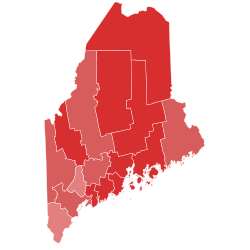 County Results White: 50–60% 60–70% 70–80% | |||||||||||||||||
| |||||||||||||||||
| Party | Candidate | Votes | % | |
|---|---|---|---|---|
| Republican | Wallace H. White Jr. (Incumbent) | 111,520 | 66.67% | |
| Democratic | Fulton J. Redman | 55,754 | 33.33% | |
| Majority | 65,766 | 33.34% | ||
| Turnout | 167,274 | |||
| Republican hold | ||||
Massachusetts
[edit]
| |||||||||||||||||
| |||||||||||||||||
Lodge: 40–50% 50–60% 60–70% 70–80% 80–90% 90–100% Casey: 40–50% 50–60% 60–70% 70–80% | |||||||||||||||||
| |||||||||||||||||
| Party | Candidate | Votes | % | ±% | |
|---|---|---|---|---|---|
| Republican | Henry Cabot Lodge Jr. (Incumbent) | 721,239 | 52.44% | +3.91% | |
| Democratic | Joseph E. Casey | 641,042 | 46.61% | +5.62% | |
| Socialist | George Lyman Paine | 4,802 | 0.35% | −0.19% | |
| Socialist Labor | Horace I. Hillis | 4,781 | 0.35% | +0.35% | |
| Prohibition | George L. Thompson | 3,577 | 0.26% | +0.26% | |
| Majority | 80,197 | 5.83% | |||
| Turnout | 1,375,441 | ||||
| Republican hold | Swing | ||||
Michigan
[edit]
| |||||||||||||||||
| |||||||||||||||||
 County results Ferguson: 40–50% 50–60% 60–70% 70–80% Brown: 40–50% 50–60% 60–70% | |||||||||||||||||
| |||||||||||||||||
| Party | Candidate | Votes | % | |
|---|---|---|---|---|
| Republican | Homer S. Ferguson | 589,652 | 49.55% | |
| Democratic | Prentiss M. Brown (Incumbent) | 561,595 | 47.19% | |
| Republican | Gerald L. K. Smith (sticker) | 32,173 | 2.70% | |
| Prohibition | Leroy M. Powell | 6,526 | 0.55% | |
| None | Scattering | 20 | 0.00% | |
| Majority | 28,057 | 2.36% | ||
| Turnout | 1,189,966 | |||
| Republican gain from Democratic | ||||
Minnesota
[edit]There were two elections to the same seat due to the August 31, 1940 death of Farmer–Laborite Ernest Lundeen. Republican Joseph H. Ball was appointed October 14, 1940 to continue the term, pending the special election. Ball was elected to the next term in the regular election, but not to finish the current term in the special election.
Minnesota (special)
[edit]
| |||||||||||||||||||||
| |||||||||||||||||||||
 County results Nelson: 40–50% 50–60% 60–70% 70–80% Hansen: 40–50% 60–70% | |||||||||||||||||||||
| |||||||||||||||||||||
| Party | Candidate | Votes | % | |
|---|---|---|---|---|
| Republican | Arthur E. Nelson | 372,240 | 56.12% | |
| Farmer–Labor | Al Hansen | 177,008 | 26.68% | |
| Democratic | John E. O’Rourke | 114,086 | 17.20% | |
| Majority | 195,232 | 29.44% | ||
| Turnout | 663,334 | |||
| Republican hold | ||||
Minnesota (regular)
[edit]
| |||||||||||||||||||||||||||||||||||||
| |||||||||||||||||||||||||||||||||||||
 County results Ball: 30–40% 40–50% 50–60% 60–70% Benson: 40–50% 50–60% Nelson: 30–40% 40–50% | |||||||||||||||||||||||||||||||||||||
| |||||||||||||||||||||||||||||||||||||
| Party | Candidate | Votes | % | |
|---|---|---|---|---|
| Republican | Joseph H. Ball (Incumbent) | 356,297 | 46.98% | |
| Farmer–Labor | Elmer A. Benson | 213,965 | 28.21% | |
| Independent | Martin A. Nelson | 109,226 | 14.40% | |
| Democratic | Ed Murphy | 78,959 | 10.41% | |
| Majority | 142,232 | 18.77% | ||
| Turnout | 758,447 | |||
| Republican hold | ||||
Mississippi
[edit]
| |||||||||||||||||
| |||||||||||||||||
 County results Eastland: 50-60% 60-70% 70-80% 80-90% >90% Doxey: 50-60% 60-70% 70-80% 80-90% Tie: 50% | |||||||||||||||||
| |||||||||||||||||
| Party | Candidate | Votes | % | |
|---|---|---|---|---|
| Democratic | James Eastland (Incumbent) | 51,355 | 100.00% | |
| Democratic hold | ||||
Montana
[edit]
| |||||||||||||||||
| |||||||||||||||||
 County results Murray: 40–50% 50–60% Rankin: 40–50% 50–60% 60–70% 70–80% | |||||||||||||||||
| |||||||||||||||||
| Party | Candidate | Votes | % | ±% | |
|---|---|---|---|---|---|
| Democratic | James E. Murray (Incumbent) | 83,673 | 49.07% | −5.91% | |
| Republican | Wellington D. Rankin | 82,461 | 48.36% | +21.25% | |
| Prohibition | Charles R. Miller | 2,711 | 1.59% | ||
| Socialist | E. H. Helterbran | 1,669 | 0.98% | ||
| Majority | 1,212 | 0.71% | −27.16% | ||
| Turnout | 170,514 | ||||
| Democratic hold | Swing | ||||
Nebraska
[edit]
| |||||||||||||||||||||
| |||||||||||||||||||||
 County results Wherry: 30–40% 40–50% 50–60% 60–70% 70–80% Norris: 30–40% 30–40% May: 30–40% | |||||||||||||||||||||
| |||||||||||||||||||||
| Party | Candidate | Votes | % | |
|---|---|---|---|---|
| Republican | Kenneth S. Wherry | 186,207 | 48.97% | |
| Independent | George W. Norris (Incumbent) | 108,899 | 28.64% | |
| Democratic | Foster May | 83,768 | 22.03% | |
| Independent | Albert F. Ruthven | 1,348 | 0.35% | |
| Majority | 77,308 | 20.33% | ||
| Turnout | 380,222 | |||
| Republican gain from Independent | ||||
Nevada (special)
[edit]
| |||||||||||||||||
| |||||||||||||||||
 County results Scrugham: 50–60% 60–70% 70–80% Creel: 50–60% 60–70% | |||||||||||||||||
| |||||||||||||||||
| Party | Candidate | Votes | % | |
|---|---|---|---|---|
| Democratic | James G. Scrugham | 23,805 | 58.72% | |
| Republican | Cecil W. Creel | 16,735 | 41.28% | |
| Majority | 7,070 | 17.44% | ||
| Turnout | 40,540 | |||
| Democratic hold | ||||
New Hampshire
[edit]
| |||||||||||||||||
| |||||||||||||||||
 County results Bridges: 50–60% 60–70% 70–80% Murphy: 50–60% | |||||||||||||||||
| |||||||||||||||||
| Party | Candidate | Votes | % | |
|---|---|---|---|---|
| Republican | Styles Bridges (Incumbent) | 88,601 | 54.61% | |
| Democratic | Francis P. Murphy | 73,656 | 45.39% | |
| Majority | 14,945 | 9.22% | ||
| Turnout | 162,257 | |||
| Republican hold | ||||
New Jersey
[edit]
| |||||||||||||||||
| |||||||||||||||||
 County results Hawkes: 50-60% 60-70% 70-80% Smathers: 50–60% 70–80% | |||||||||||||||||
| |||||||||||||||||
| Party | Candidate | Votes | % | |
|---|---|---|---|---|
| Republican | Albert W. Hawkes | 648,855 | 53.09% | |
| Democratic | William H. Smathers (Incumbent) | 559,851 | 45.81% | |
| Socialist | William L. Becker | 6,775 | 0.55% | |
| Independent Progressive | Lorenzo Harris | 3,224 | 0.26% | |
| Prohibition | Elmo L. Bateman | 1,438 | 0.12% | |
| Socialist Labor | John C. Butterworth | 1,310 | 0.11% | |
| Socialist Workers | George Breitman | 679 | 0.06% | |
| Majority | 89,004 | 7.28% | ||
| Turnout | 1,222,132 | |||
| Republican gain from Democratic | ||||
New Mexico
[edit]
| |||||||||||||||||
| |||||||||||||||||
 County results Hatch: 50–60% 60–70% 70–80% 80–90% Newell: 50–60% | |||||||||||||||||
| |||||||||||||||||
| Party | Candidate | Votes | % | |
|---|---|---|---|---|
| Democratic | Carl Hatch (Incumbent) | 63,301 | 59.16% | |
| Republican | J. Benson Newell | 43,704 | 40.84% | |
| Majority | 19,597 | 18.32% | ||
| Turnout | 107,005 | |||
| Democratic hold | ||||
North Carolina
[edit]
| |||||||||||||||||
| |||||||||||||||||
 County results Bailey: 50–60% 60–70% 70–80% 80–90% 90-100% Morris: 50–60% 60–70% 70–80% | |||||||||||||||||
| |||||||||||||||||
| Party | Candidate | Votes | % | |
|---|---|---|---|---|
| Democratic | Josiah Bailey (Incumbent) | 230,427 | 65.91% | |
| Republican | Sam J. Morris | 119,165 | 34.09% | |
| Majority | 111,262 | 31.82% | ||
| Turnout | 349,592 | |||
| Democratic hold | ||||
Oklahoma
[edit]
| |||||||||||||||||
| |||||||||||||||||
 County results Moore: 50–60% 60–70% 70–80% Lee: 50–60% 60–70% 70–80% 80–90% | |||||||||||||||||
| |||||||||||||||||
| Party | Candidate | Votes | % | |
|---|---|---|---|---|
| Republican | Edward H. Moore | 204,163 | 54.83% | |
| Democratic | Joshua B. Lee (Incumbent) | 166,653 | 44.76% | |
| Prohibition | Oliver W. Lawton | 1,549 | 0.42% | |
| Majority | 37,510 | 10.07% | ||
| Turnout | 372,365 | |||
| Republican gain from Democratic | ||||
Oregon
[edit]
| |||||||||||||||||
| |||||||||||||||||
 County results McNary: 70-80% 80-90% | |||||||||||||||||
| |||||||||||||||||
| Party | Candidate | Votes | % | |
|---|---|---|---|---|
| Republican | Charles L. McNary (Incumbent) | 214,755 | 77.06% | |
| Democratic | Walter W. Whitbeck | 63,946 | 22.94% | |
| Majority | 150,809 | 54.12% | ||
| Turnout | 278,701 | |||
| Republican hold | ||||
Rhode Island
[edit]| Party | Candidate | Votes | % | |
|---|---|---|---|---|
| Democratic | Theodore F. Green (Incumbent) | 138,247 | 57.97% | |
| Republican | Ira Lloyd Letts | 100,240 | 42.03% | |
| Majority | 38,007 | 15.94% | ||
| Turnout | ||||
| Democratic hold | ||||
South Carolina
[edit]
| |||||||||||||||||
| |||||||||||||||||
 County results Maybank: 50–60% 60–70% 80–90% Blease: 50–60% 60–70% 80–90% | |||||||||||||||||
| |||||||||||||||||
| Party | Candidate | Votes | % | |
|---|---|---|---|---|
| Democratic | Burnet R. Maybank (Incumbent) | 22,556 | >99.9% | |
| No party | Write-Ins | 2 | <0.1% | |
| Majority | 22,554 | >99.9% | ||
| Turnout | 22,558 | |||
| Democratic hold | ||||
South Dakota
[edit]
| |||||||||||||||||
| |||||||||||||||||
 County results Bushfield: 50–60% 60–70% 70–80% 80–90% Berry: 50–60% 60–70% No Vote: | |||||||||||||||||
| |||||||||||||||||
| Party | Candidate | Votes | % | |
|---|---|---|---|---|
| Republican | Harlan J. Bushfield | 106,704 | 58.74% | |
| Democratic | Tom Berry | 74,945 | 41.26% | |
| Majority | 31,759 | 17.48% | ||
| Turnout | 181,649 | |||
| Republican gain from Democratic | ||||
Tennessee
[edit]
| |||||||||||||||||||||
| |||||||||||||||||||||
| |||||||||||||||||||||
| Party | Candidate | Votes | % | |
|---|---|---|---|---|
| Democratic | Tom Stewart (Incumbent) | 109,881 | 68.88% | |
| Republican | F. Todd Meacham | 34,324 | 21.52% | |
| Independent | John Randolph Neal Jr. | 15,317 | 9.60% | |
| Majority | 75,557 | 47.36% | ||
| Turnout | 159,522 | |||
| Democratic hold | ||||
Texas
[edit]
| |||||||||||||||||
| |||||||||||||||||
 | |||||||||||||||||
| |||||||||||||||||
| Party | Candidate | Votes | % | |
|---|---|---|---|---|
| Democratic | W. Lee O'Daniel (Incumbent) | 260,629 | 94.90% | |
| Republican | Dudley Lawson | 12,064 | 4.39% | |
| People’s Unity | Charles L. Somerville | 1,934 | 0.70% | |
| Majority | 248,565 | 90.51% | ||
| Turnout | 274,627 | |||
| Democratic hold | ||||
Virginia
[edit]
| |||||||||||||||||
| |||||||||||||||||
 County and independent city results Glass: 80–90% 90-100% No Data/Vote: | |||||||||||||||||
| |||||||||||||||||
| Party | Candidate | Votes | % | ±% | |
|---|---|---|---|---|---|
| Democratic | Carter Glass (Incumbent) | 79,421 | 91.08% | +0.58% | |
| Socialist | Lawrence S. Wilkes | 5,690 | 6.53% | +6.53% | |
| Communist | Alice Burke | 2,041 | 2.34% | −1.00% | |
| Write-ins | 48 | <0.01% | −0.07% | ||
| Majority | 73,731 | 84.55% | −2.40% | ||
| Turnout | 87,200 | ||||
| Democratic hold | |||||
West Virginia
[edit]There were 2 elections to the same seat due to the January 12, 1941 resignation of Democrat Matthew M. Neely who was elected Governor of West Virginia. Democrat Joseph Rosier was appointed January 13, 1941 to continue the term, pending the special election. Primaries for both races were held August 4, 1942.
West Virginia (special)
[edit]
| |||||||||||||||||
| |||||||||||||||||
 County results Shott: 50–60% 60–70% 70–80% 80–90% Rosier: 50–60% 60–70% | |||||||||||||||||
| |||||||||||||||||
Interim Democrat Joseph Rosier easily won the primary,[13] but lost the special election to finish the term that would end in January 1943 to former congressman and 1936 Senate nominee Hugh Ike Shott.
| Party | Candidate | Votes | % | |
|---|---|---|---|---|
| Republican | Hugh Ike Shott | 227,469 | 52.27% | |
| Democratic | Joseph Rosier (Incumbent) | 207,678 | 47.73% | |
| Majority | 19,791 | 4.54% | ||
| Turnout | 435,147 | 22.88% | ||
| Republican gain from Democratic | ||||
West Virginia (regular)
[edit]
| |||||||||||||||||
| |||||||||||||||||
 County results Revercomb: 50–60% 60–70% 70–80% 80–90% Neely: 50–60% 60–70% | |||||||||||||||||
| |||||||||||||||||
Neither Shott nor Rosier were candidates in the regular election. Instead, governor (and former senator) Neely ran to reclaim his seat, having regretted leaving the Senate.
Neely won the Democratic primary[15] but lost the regular election.
| Party |
|---|


 French
French Deutsch
Deutsch
